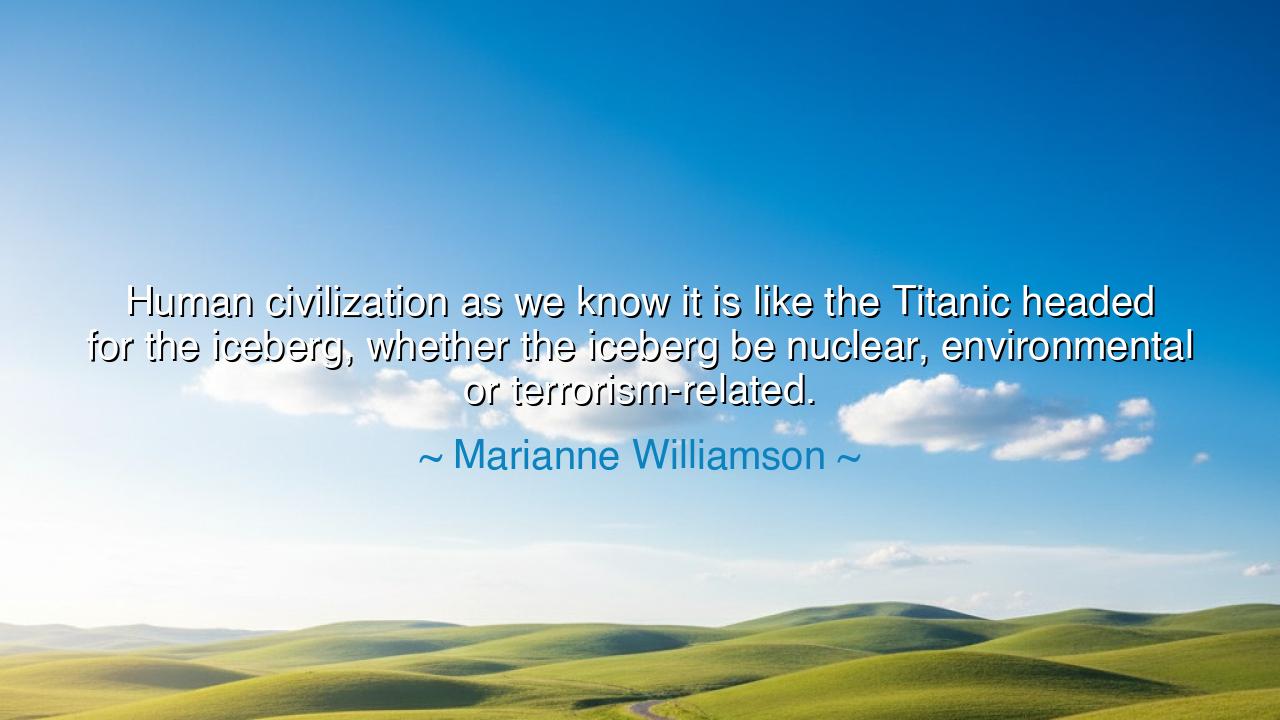
Human civilization as we know it is like the Titanic headed for
Human civilization as we know it is like the Titanic headed for the iceberg, whether the iceberg be nuclear, environmental or terrorism-related.






The words of Marianne Williamson—“Human civilization as we know it is like the Titanic headed for the iceberg, whether the iceberg be nuclear, environmental or terrorism-related.”—ring with the solemnity of prophecy and the urgency of warning. In these words, Williamson does not merely describe a potential catastrophe; she captures the spiritual blindness of an age that rushes toward destruction while believing itself unsinkable. Her metaphor of the Titanic, that grand vessel of human pride, mirrors the peril of our own civilization—technologically advanced, materially rich, yet morally adrift. It is a call for awakening, a plea for wisdom before arrogance seals our fate.
The origin of this quote springs from Williamson’s lifelong calling as a spiritual teacher, writer, and advocate for conscious living. She speaks not as a scientist, but as a moral philosopher of the modern age—one who sees that the crises of our time are not merely physical but spiritual in nature. The Titanic, a marvel of human engineering, was declared “unsinkable,” yet it met its doom through a fatal combination of speed, pride, and disbelief in danger. So too, Williamson warns, our civilization has built towers of brilliance—nuclear power, vast industries, and global networks—yet moves ever faster toward its own reckoning, driven by greed, division, and denial. Her words remind us that technology without wisdom is like a ship without a compass, destined to meet the iceberg it refuses to see.
The ancients knew well the folly of hubris. In the myth of Icarus, the young man, intoxicated by flight, soared too close to the sun, his waxen wings melting as he plummeted to his death. Humanity today, Williamson suggests, has become like Icarus—dazzled by its own achievements, flying higher than nature or morality can sustain. Our weapons can destroy cities in seconds; our industries consume the earth’s breath; our politics, fractured and inflamed, leave hearts hardened and divided. Each of these—nuclear, environmental, terrorism-related—is an iceberg rising from the dark waters of our collective unconscious, born of fear, ignorance, and the illusion of control.
History, too, gives us echoes of this warning. Before the fall of Rome, voices cried out about decadence, corruption, and moral decay—but few listened. The empire, magnificent yet hollow, collapsed not because of enemies at its gates, but because of rot within its soul. In every age, civilizations have believed themselves eternal, only to find that time humbles all who forget humility. Williamson’s words remind us that the pattern endures: when progress outpaces compassion, when knowledge grows but wisdom shrinks, collapse becomes inevitable.
Yet her vision is not one of despair, but of awakening. The iceberg, though deadly, can still be avoided if the ship changes course. Williamson’s message is that humanity still has time—time to reclaim its conscience, to value life above power, and to place cooperation above conquest. The very crises she names—nuclear, environmental, terroristic—are not punishments, but signals, warnings that call us back to balance. If we respond with fear, we sink; if we respond with wisdom, we rise renewed. Like the captain who heeds the sea’s whisper instead of its roar, our fate depends on our willingness to listen before it is too late.
The spiritual depth of her metaphor lies in its simplicity: the Titanic is us. Each of us, in our daily lives, is part of this great ship of civilization. Our consumption, our anger, our indifference—each small act adds weight to the vessel. But so too can our compassion, mindfulness, and courage lighten its load. The turning of civilization begins with the turning of the individual heart. If each person chooses integrity over comfort, empathy over apathy, truth over convenience, the direction of the ship begins to change.
The lesson, then, is as timeless as it is urgent: do not wait for the iceberg to appear before you awaken. Humanity’s salvation lies not in grand speeches or policies alone, but in the quiet revolution of awareness. Let us slow the ship. Let us question the course. Let us remember that progress without purpose is peril disguised as triumph. For if we steer by greed, we will strike the cold silence of our own making—but if we steer by love, we may yet glimpse the dawn of a new and wiser world.
So, heed Williamson’s warning as the ancients would heed the voice of an oracle. The iceberg is near, but it is not our destiny to perish—it is our destiny to choose differently. Let each generation take the helm with courage, guided not by pride but by conscience. For the sea of history is vast and merciless, but those who sail with awareness shall find their way through the night, and their ship—our civilization—shall endure.






AAdministratorAdministrator
Welcome, honored guests. Please leave a comment, we will respond soon